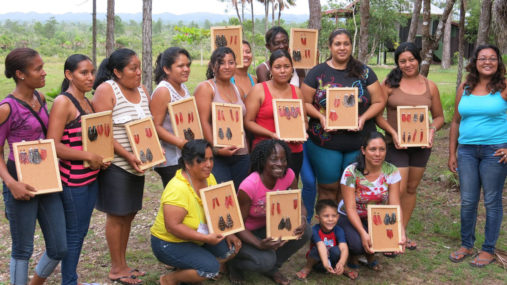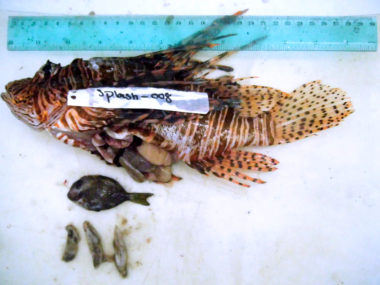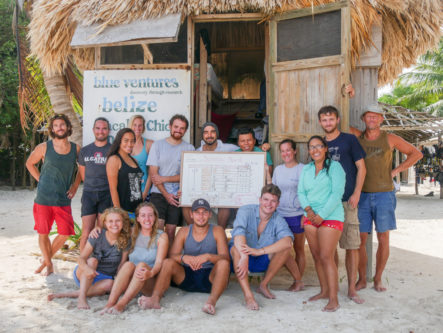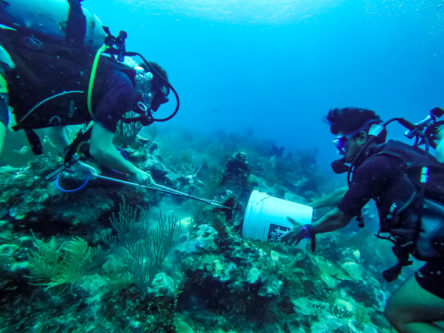We combined marine science, volunteering, underwater charades and Christmas jumpers as we took the story of our volunteers’ valuable work in Belize on the road for the 2017 European Coral Reef Symposium (ECRS).
This international conference gathered hundreds of marine scientists together to share knowledge, stories and ocean optimism, in addition to launching 2018 as the International Year of the Reef (#IYOR2018).
Blue Ventures was involved in several aspects of the conference: Victoria Jeffers was on the organising committee, Hannah Gilchrist was a volunteer assisting with the running of the event, Amy Wright was selling lionfish jewellery from a Blue Ventures booth in support of Belioness, and I was presenting results on our efforts to tackle the invasive lionfish in Belize. But before I get into that, let me introduce the key concepts: what are lionfish, and why are they posing such a problem in the Caribbean?
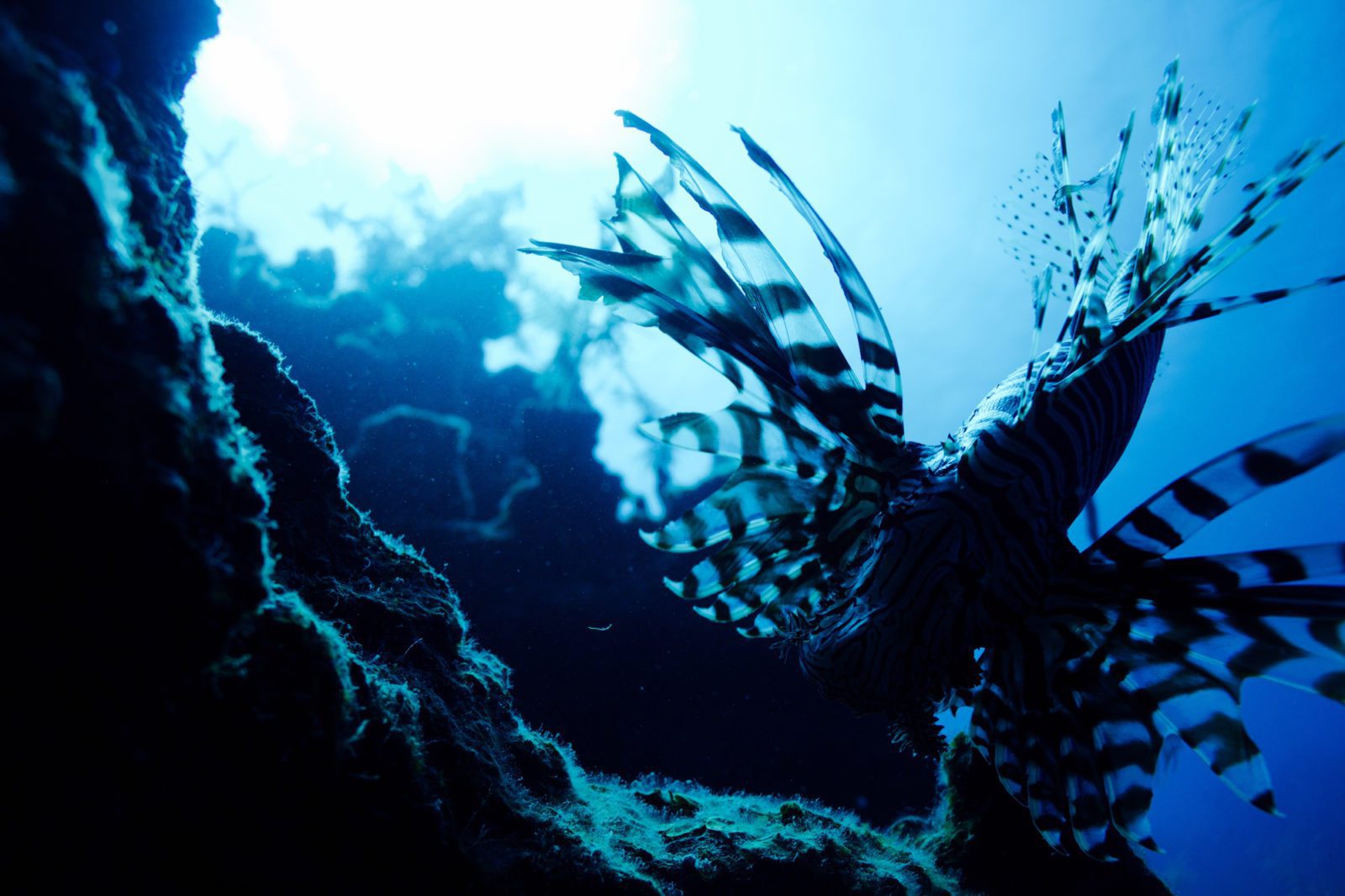
What are lionfish? Introducing a marine villain…
When Blue Ventures volunteers plunge into the blue waters of the Bacalar Chico Marine Reserve (BCMR) in Belize, they may encounter queen parrotfish, blue tangs, nurse sharks, hawksbill turtles and the countless other creatures that form a Caribbean reef community. However, amongst this huge diversity of wildlife there is one unwelcome visitor which is sighted on almost every dive: the venomous lionfish!
This invasive species, native to the Indian and Pacific oceans, was accidentally introduced into the seas around Florida in the 1980s and has since colonised the entire Caribbean region. The consequences for native reef species have been profound, as the lionfish is a voracious hunter capable of wiping out entire populations of juvenile fish which have no defence against this unfamiliar, alien predator. The lionfish is now so numerous and widespread (they can live at depths of seven hundred metres and one female can produce millions of eggs per year) that eradication is considered impossible, and their impact can only be reduced through constant management.
This marine menace arrived in Belize in 2008, and Blue Ventures is at the forefront of national efforts to address the problem. Our initiatives include lionfish surveys and culling at our expedition site in the BCMR, supporting Belioness; a women’s group who turn lionfish fins into beautiful handicrafts, and educating fishing families on how to safely catch and cook this spiky species. At the policy level, Blue Ventures is playing a central role in the creation of a Belize National Lionfish Management Strategy, which aims to plot future actions involving fishers, government, tourism operators and other relevant parties.
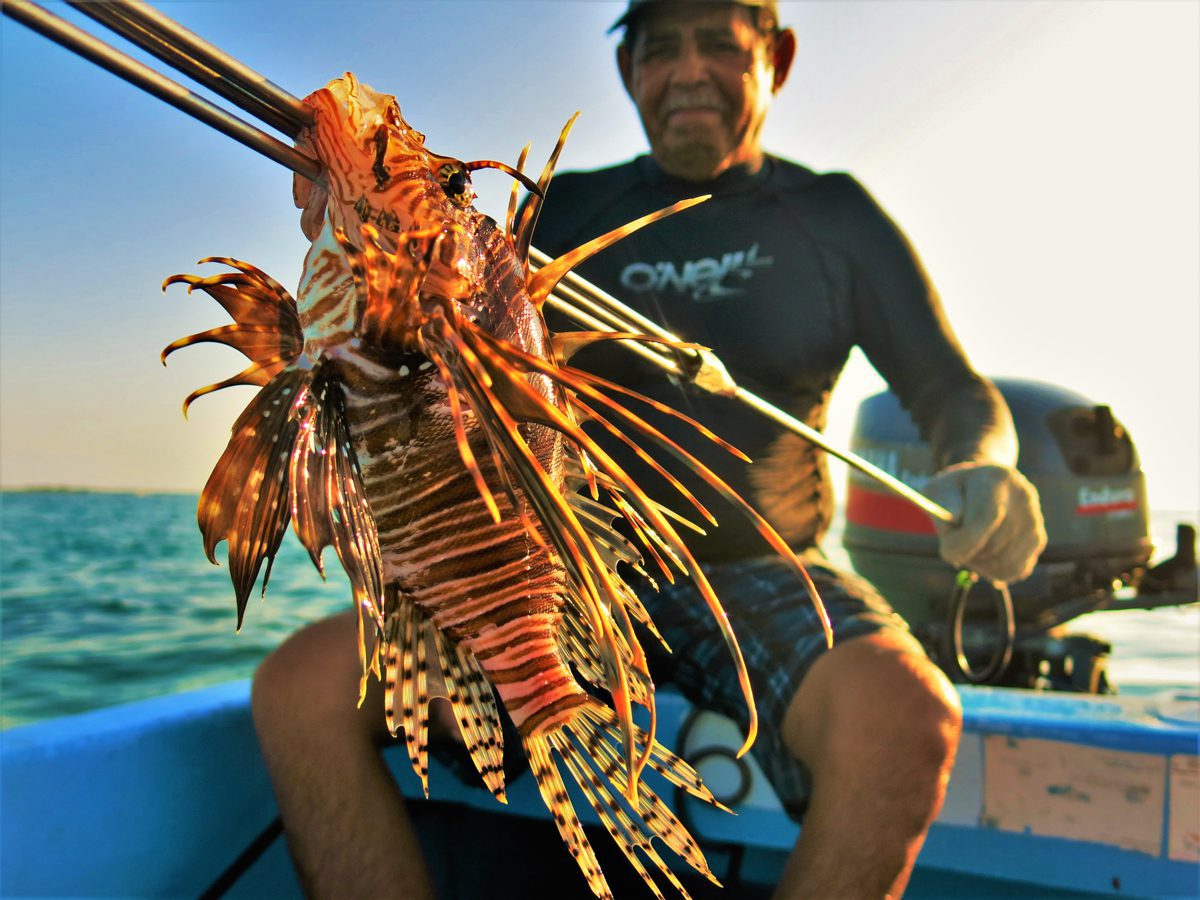
A Belizean fisherman with a freshly caught lionfish
With all this in mind, our presence at ECRS was an ideal opportunity to share lessons on lionfish management and volunteer science with an international audience. Our presentation formed part of a wider session addressing the role of citizen scientists in marine conservation, and we were able to deliver several key positive messages arising from our Belize expeditions, based on data collected by staff and volunteers between 2011 and 2015.
Thanks to the efforts of our expedition staff and volunteers, we now have invaluable information on the biology and behaviour of lionfish populations across the dive sites of the BCMR!
At the core of my presentation (made whilst wearing a suitably festive jumper for #ChristmasJumperDay) was the huge value of our Belize volunteers. They have been essential to the success of Blue Ventures’ lionfish management work in the BCMR, with their keen eyes and hard work yielding huge quantities of useful data which we could not have collected without their dedication. During their expeditions, our volunteers master a range of skills, including the use of a complex set of hand signals to communicate survey information underwater – the aforementioned ‘underwater charades’. The signal for a ‘swimming, exposed tiger grouper’ is quite something to behold – you’ll have to use your imagination!
Thanks to the efforts of our expedition staff and volunteers, we now have invaluable information on the biology and behaviour of lionfish populations across the dive sites of the BCMR. One of our important findings is that the lionfish of Bacalar Chico seem to prefer hiding from us in deeper waters, with six times as many lionfish recorded in deep water (18-30 metres) compared to shallower reefs! I was also delighted to share the substantial involvement of volunteers in our successful culling programme, which has resulted in the removal of a staggering 1455 lionfish over five years! Well done everyone!

Presenting at ECRS 2017!
In even better news, we have evidence that all this effort is paying dividends. Our Belize staff are currently working on a five-year report which, among other things, presents our research on the impact of lionfish on juvenile fish (the invader’s favourite food) in the BCMR. I am glad to reveal that juvenile fish populations have remained constant throughout 2011–2015, whereas uncontrolled lionfish populations have caused catastrophic declines in juvenile fish elsewhere in the Caribbean. So for now we can say that the lionfish of the BCMR appear to be under control on our beautiful patch of the Belize Barrier Reef.
The time for action is now and there has never been a better time to get involved in our expeditions and play your part in #IYOR2018.
It was hugely exciting to share these positive outcomes and our successful volunteer science methods with the ECRS community, as well as learning from others who presented their own fascinating experiences. The collective message from the session participants was clear: volunteers, when supported by thorough training and knowledgeable field staff, have enormous potential to support marine science and conservation initiatives. We believe that the programme in Belize and our other expeditions in Madagascar and Timor-Leste demonstrate the immense value of volunteer programmes, in terms of delivering high quality science and lasting benefits for our partner communities. While you read this blog our newest group will likely be at Bacalar Chico Dive Camp, ready and raring to dive in and meet the challenge of the invasive lionfish.
As a Field Scientist in Belize during 2017, I found the dedication of our volunteers to be a constant source of motivation and #OceanOptimism, and I relished the opportunity of contributing to Blue Ventures’ field science programmes. In 2018, the International Year of the Reef, our staff and volunteers will be working tirelessly to secure the future of coral reefs around the world. The time for action is now and there has never been a better time to get involved in our expeditions and play your part in #IYOR2018.
Conservation ecotourism: why the model works, a photo story by Blue Ventures.
Cover photo by Belize volunteer Deborah Vendrig.


